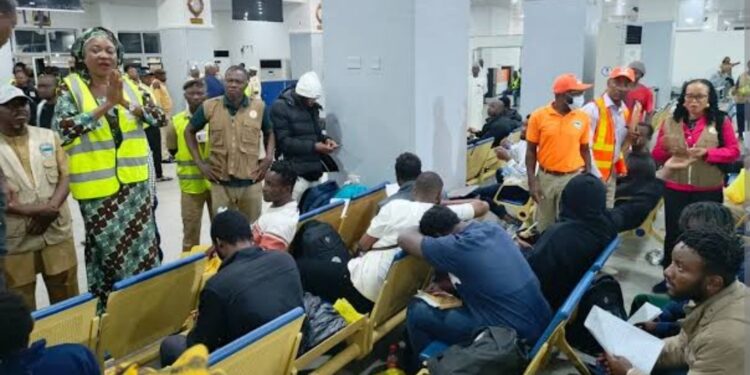The Federal Government has received 103 Nigerians deported from Turkey due to various migration-related issues such as expired visas and irregular migration.
This was disclosed by Alhaji Tijani Ahmed, the Federal Commissioner of the National Commission for Refugees, Migrants, and Internally Displaced Persons (NCFRMI), during the deportees’ profiling in Abuja on Friday evening.
Represented by Amb. Catherine Udida, the Director of Migration Affairs at the commission, Ahmed mentioned that while 110 deportees were expected, 103 were received, all of whom were male.
“Some of them have been in the deportation camp for months. Now that they are here, we will follow up on all the allegations gathered during their profiling,” he stated.
He emphasized that they would investigate claims that some deportees’ passports were seized, noting that the passports remain the property of the Federal Republic of Nigeria.
Ahmed reiterated that NCFRMI is mandated to handle all returnees, regardless of their status. “We also have a program where we train them and then reintegrate them into society,” he added.
Mr. Bashir Garga, the North-Central Zonal Coordinator of the National Emergency Management Agency (NEMA), assured the returnees of the government’s readiness to support them through collaborative efforts with relevant agencies.
One of the deportees, Mr. Arinze Stone, recounted his ordeal, saying he had been detained in a Turkish camp for about six months.
Stone, who had been living in Turkey for several years conducting business, claimed that the Turkish authorities were arresting people whose documents were either not yet issued or had just expired.
He alleged that the European Union’s payment to Turkey for handling illegal immigrants had led to the Turkish government ceasing the issuance and renewal of resident permits.
“Each day, the European Union pays 120 Euros per immigrant in the Immigration Camp,” he said.
Stone added that despite paying 700 Euros for tax and insurance, his renewal was canceled, and he was not given the deportation fee of about 2,500 Euros.
Another deportee, Mr. Moses Emeh, shared his experience, stating that his registered company in Turkey had been functioning for over eight years.
He mentioned that his resident permit was forcibly canceled despite his plans to convert it into a working permit. “I believe this is a diplomatic issue, and I trust our foreign affairs minister to follow it up.
There should also be a sensitization program for Nigerians still in Turkey because the Turkish government is not being sincere and transparent with us,” Emeh stated.
He detailed that he was detained in a dungeon for nearly 12 months and was coerced into signing deportation documents under the threat of prolonged detention.
The returnees were provided with dignity kits, starter packs, and stipends to assist them in traveling to their respective destinations.
NAN
